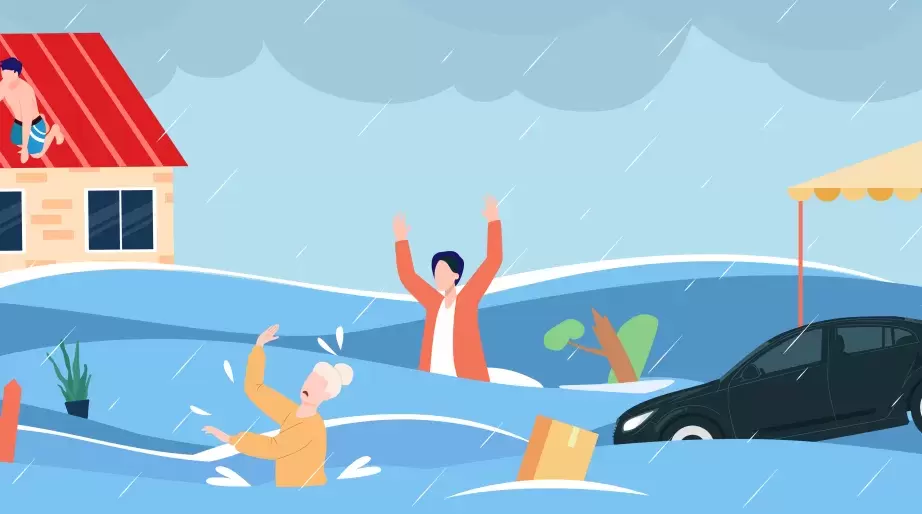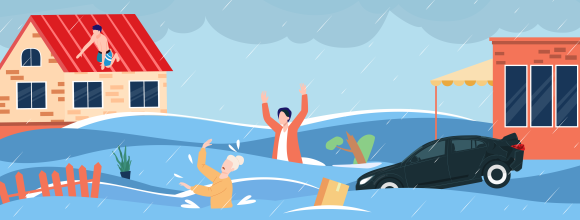Weathering the storm: A guide to travel insurance and protection during typhoon season


Recent heavy rainfall, coupled with the onset of June, signals the arrival of typhoon season, significantly increasing the likelihood of extreme weather affecting travel plans. Memories are still fresh of the rare torrential rain that hit Dubai and various parts of the UAE in mid-April – the heaviest in 75 years – which was accompanied by strong winds and led to widespread flooding. This resulted in the closure of Dubai airport’s waterlogged runways, damage to airport facilities and severe flight disruptions. As you might expect, many travellers were left stranded for days – their plans completely derailed.
In my previous article, I discussed the timing for purchasing travel insurance. Today, I will delve further into more intricate details, such as the conditions under which coverage periods are automatically extended, and how “known risks” and “cut-off times” impact claims for unforeseen incidents. Gaining a comprehensive understanding of these details will ensure that you maximise the benefits of your travel insurance coverage.
What if you are stranded and your coverage expires?
When adverse weather or other insured events cause travel delays, travel insurance can cover additional expenses or non-refundable costs. Typically, these might include hotel bookings or tickets to amusement parks or concerts. But what happens if the bad weather persists and prevents you from returning to Hong Kong before your travel insurance expires? Do you need to purchase new travel insurance to continue enjoying coverage? In fact, if travellers are forced to stay longer because of exceptional circumstances, most travel insurance products on the market will automatically extend the coverage period free of charge, typically for 10 to 14 days. During this extended period, any additional accommodation and transportation expenses you incur will be covered, alleviating concerns about loss of coverage.
Beware of ‘known risks’ and ‘cut-off times’
When is the best time to buy travel insurance? Can you still make a claim if you buy travel insurance only after an unexpected event occurs at your destination country? What if you sustain an injury before you return to Hong Kong, but only purchase travel insurance after you are injured? To answer these questions, you must first understand the definition of “known risks”. Put simply, any incident that has already occurred at the time of purchase will be classified by the insurance company as a “known risk”. According to policy terms, all “known risks” are not covered.
Additionally, insurance companies have the right to set a “cut-off time” for their travel insurance products following unexpected events (such as natural disasters). This means that policies issued after the specified deadline will not be covered for trip cancellation or delay due to those events. For example, if an earthquake causes significant damage to a city on 23 June, and the insurance company sets that date as the “cut-off time”, any travel insurance purchased on or after 24 June will not cover trip cancellations resulting from the earthquake. Therefore, the best time to buy travel insurance is directly after you book your tickets. The earlier you take out an insurance plan, the fewer variables you face, and the more you can be assured that you will be covered if an incident were to occur.
Lastly, it’s important to note that most travel insurance products on the market require your trip to begin in Hong Kong for it to be eligible for coverage. Also, be sure to check the regions and countries covered by the plan. Selecting the right product based on your needs and travel plans will ensure a worry-free journey. Stay safe and travel smart with the right travel insurance!
This Chinese version of this article was published in the Hong Kong Economics Journal
If you have any queries regarding Travel Insurance Plans, please feel free to contact us ![]() or find out more about our insurance plans:
or find out more about our insurance plans:
Read more: Coping with earthquakes: the pivotal role of travel insurance during natural disasters
Learn more about EASY Claims and file your claims online anytime, anywhere.



